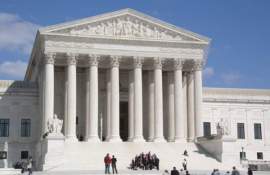
Worcester v. Georgia

The Background of Worcester v. Georgia (1832)
Legislative statutes in the State of Georgia – subsequent to an agreement between the Tribal Council of the Cherokee Nations and the State of Government of Georgia – instituted a prohibition of non-Native Americans from residing in Native American Territories; a stipulation within this statute allowed only non-Native Americans with expressed governmental in the form of licenses to be permitted to reside in these territories.
Missionary Samuel A. Worcester, along with his wife and 5 fellow missionaries, refused to vacate from areas deemed as ‘Indian Territories’; furthermore, the missionaries abstained from applying for a license for residence due to the fact that they feared that they would be denied. As a result of their collective refusal, the military entered the Native American Territories and apprehended Worcester and the 6 other individuals. Subsequent to his arrest, Worcester appealed his conviction to the Supreme Court.
The Case Profile of Worcester v. Georgia
The following is a case profile of the legal trial eponymously titled ‘Worcester v. Georgia’:
Date of the Trial: February 20th, 1832
Legal Classification: Administrative Law; this legal field regulates ‘due process’, which is defined as the government’s obligation to respect, maintain, and uphold the legal rights of its citizens in the event of an arrest. Both the Federal and State government must preserve and protect an individual’s human rights and liberties; this includes fair, respectful, and ethical treatment devoid of undue violence and harm
Accused Criminal Activity:
The following criminal activity and charges were cited by Samuel A. Worcester against the State of Georgia within the appeal brought forth subsequent to the initial ruling:
Worcester claimed that his removal was a violation of his constitutional rights, as the State government of Georgia did not maintain the jurisdiction to enforce legislation within Native American Territories
United States Reports Case Number: 31 U.S. 515
Date of the Delivery of the Verdict: March 3rd, 1832
Legal Venue of Worcester v. Georgia: The Supreme Court of the United States
Judicial Officer Responsible for Ruling: Chief Justice John Marshall
Involved Parties: The following are the parties named with regard to their involvement in the Worcester v. Georgia case:
Samuel A. Worcester; Plaintiff - Worcester v. Georgia
The State of Georgia; Defendant - Worcester v. Georgia
Verdict Delivered: John Marshall ruled in favor of Worcester, validating Worcester’s claim that the State government of Georgia was unable to enact legislation within areas that were not within the jurisdiction of the State of Georgia - Marshall continued by stating that the interactions between the Cherokee and the State of Georgia should be approached as international relations
Associated Legislation with regard to Worcester v. Georgia: The following statutory regulations were employed with regard to the Worcester v. Georgia trial:
The 14th Amendment illustrates legislation that disallows the government from infringing on the right(s) to pursue ‘Life, Liberty, and the Pursuit of Happiness’ with regard to any and all citizens of the United States of America – this statute is applicable to all measures of gender, race, religion, and age
Due process is defined as the government’s obligation to respect, maintain, and uphold the legal rights of its citizen in the event of an arrest; the government must retain an individual’s human rights and liberties – this includes fair, respectful, and ethical treatment devoid of undue violence and harm
NEXT: What is the Black Sox Scandal?




















